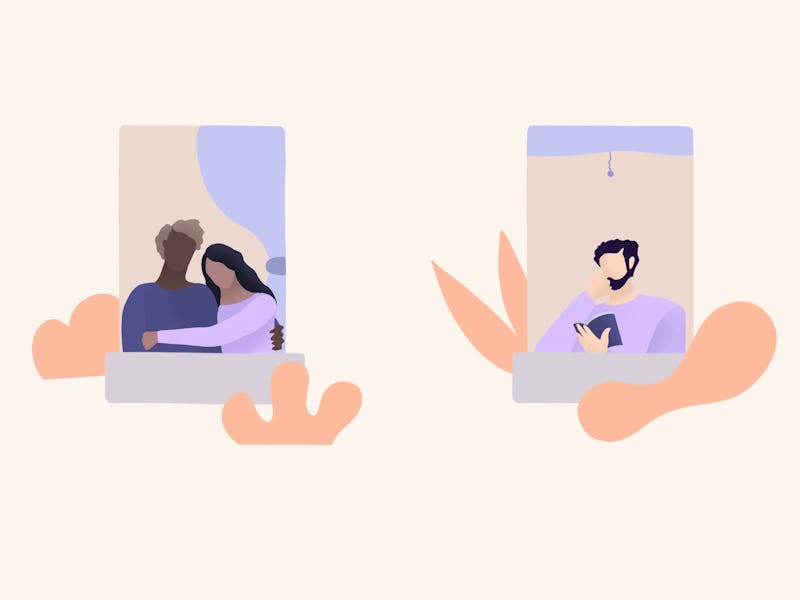Psychologists reveal 2 simple methods to fight the effects of loneliness
Loneliness is bad for your health, but fortunately there are a few ways to combat it.

For many of us who've been working from home over the past months, it can start to feel isolating when your interactions with friends and loved ones are confined to texts, calls, video chats, or the rare masked visit. For people without strong social ties, this can lead to loneliness, which recent research has shown to be a huge danger to our health.
“Being connected to others socially is widely considered a fundamental human need — crucial to both well-being and survival” Julianne Holt-Lunstad, a professor of psychology at Brigham Young University, said in 2017. “Yet an increasing portion of the US population now experiences isolation regularly.”
Holt-Lunstad’s research looked at data from more than 200 studies. In one, she and her team looked at 148 studies that represented more than 300,000 participants and found that greater social connection is associated with a 50 percent reduced risk of early death. In a second analysis that involved 70 studies representing more than 3.4 million people, the researchers found that social isolation, loneliness, or living alone had a significant effect on the risk of premature death that was equal to or more than other risk factors such as obesity.
“Many nations around the world now suggest we are facing a ‘loneliness epidemic,’” Holt-Lunstad said. “The challenge we face now is what can be done about it.”
Other studies also confirmed the ill effects that loneliness has on our health:
It’s bad for the heart
Anne Vinggaard Christensen, a researcher from The Heart Centre at Copenhagen University Hospital, found that loneliness was associated with poor outcomes in patients suffering from heart disease, regardless of their age, level of education, other diseases, body mass index, alcohol intake, and whether they smoked. She reached this conclusion after looking at questionnaires and health outcomes of 13,463 patients who were discharged from the hospital.
It causes cellular changes
Loneliness triggers physiological responses that can ultimately make us sick, according to research published by the Proceedings of the National Academy of Sciences. Analyzing humans and rhesus macaques, a highly social primate species, the researchers found that feeling alone leads to fight-or-flight stress signaling that can ultimately affect the production of white blood cells, leading to a less effective immune response and more inflammation.
It could lead to poor sleep
In a study of more than 2,000 British young adults, King’s College London researchers found that lonelier people were 24 percent more likely to feel tired and have difficulty concentrating during the day. Researchers theorize this could be due to lonely people feeling less safe, and that they could have a heightened biological stress response.
Loneliness is bad for your health, but fortunately there are two simple ways to fight back against its effects.
Finding a dog to pet and hug can significantly ease the effects of loneliness.
1. Meditation reduces the effects of loneliness
Meditation has been shown to be incredibly helpful to reduce stress and work more effectively. University of California, Los Angeles, researchers have found that an eight-week meditation program reduced loneliness in older adults. The program, mindfulness-based stress reduction (MBSR), teaches the mind to be attentive to the present and not dwell in the past or project into the future. It also altered the genes and protein markers of inflammation.
The study involved 40 adults between the ages of 55 and 85 who were randomly assigned to a mindfulness meditation group or a control group that did not meditate. The meditators attended weekly two-hour meetings to learn the techniques of mindfulness, practiced mindfulness meditation for 30 minutes each day at home, and attended a single daylong retreat.
Participants self-reported a reduced sense of loneliness, and blood tests showed a significant decrease in the expression of inflammation-related genes, the researchers said.
2. And so do dogs
People feeling the effects of loneliness should find a dog to hug, according to research published in the Journal of Creativity in Mental Health. The researchers provided animal-assisted therapy under the supervision of a licensed mental health practitioner to 55 college students in a group setting. The students’ self-reported anxiety and loneliness symptoms dropped 60 percent following the animal-assisted therapy, researchers said, in which they were able to pet, hug, feed, brush, draw, photograph, sit near, and play fetch with Sophie the therapy dog for up to two hours.
Of course, therapy played a part in the treatment, but 84 percent of the students said their interaction with the therapy dog was the most significant part of the program.
“The presence of a therapy dog facilitates a therapeutic connection between the client and the mental health professional,” said study co-author Lindy Parker. “When you’re trying to do mental health work with someone, establishing that therapeutic relationship and rapport is so important. Any way to do it faster or more effectively only helps facilitate the therapeutic process.”